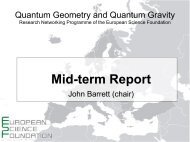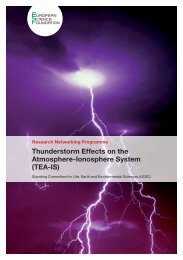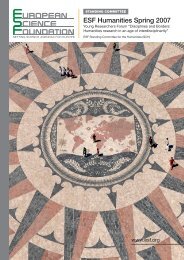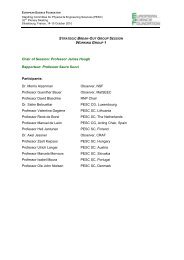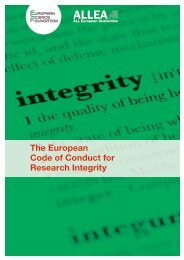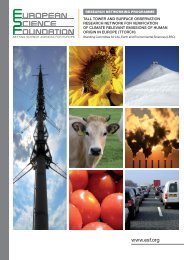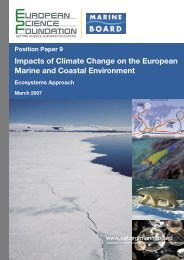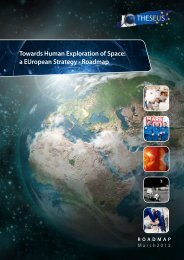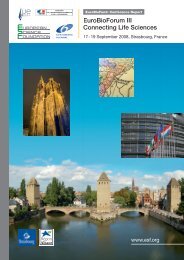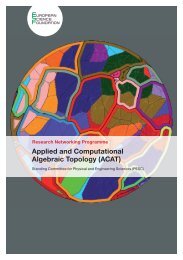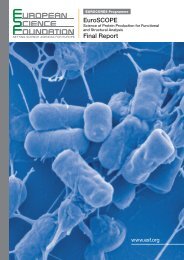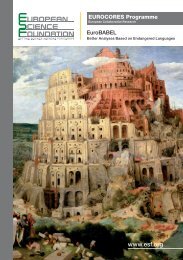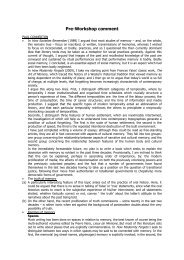Synthesis Report - European Science Foundation
Synthesis Report - European Science Foundation
Synthesis Report - European Science Foundation
Create successful ePaper yourself
Turn your PDF publications into a flip-book with our unique Google optimized e-Paper software.
Annex 5. Glossary50Responses to Environmental and Societal Challenges for our Unstable Earth (RESCUE)Words are marked with an asterisk (*) when they first appearin the main body of the report.Agent-based modellingComputational dynamical modelling of the actions, behavioursand interactions of autonomous agents (both individualand collective entities such as organisations or groups) withthe aim of better understanding the functioning of a complex(adaptive) system as a whole. Such systems often self-organisethemselves and create emergent order.AnthropoceneThe Anthropocene is the name of an emerging epoch in planetaryhistory (Crutzen and Stoermer, 2000), a successor tothe Holocene epoch, the last interglacial period. Most of thewritings related to the Anthropocene suggest that it startedin the late 18 th century, when the rapidly growing combustionof fossil fuels began to change the composition of theatmosphere (Tickell, 2011; Steffen et al., 2011). While thereis no formal date for its beginning, Crutzen (2002) suggeststhat the Industrial Revolution of 250 years ago would be alogical one since this is the point in time that coincides withthe first signals of increasing global concentrations of carbondioxide and methane as measured in air trapped in polar ice.Since the start of this new epoch, the impact of human activityhas begun to equal the measurable impact of geologicalforces, in speed and intensity, creating a completely novel situationthat poses fundamentally new questions and requiresnew ways of thinking and acting (see Zalasiewicz et al., 2010;2011; for a review of the origin of the term).Co-production of knowledgeSustainable development requires production of knowledgethat strikes a balance between scientific and other forms ofknowledge. Therefore, increasing attention has been givento interactive ways of producing knowledge. The term ‘coproduction’refers to processes in which scientific and societalactors negotiate how different sources of knowledge can bebrought together into new mutual understandings, e.g., see:www.envphil.ethz.ch/people/pohlc/papers/Pohl_et_al_2010.pdfDecision makers and decision makingFor sustainable development, decisions will have to be madeby all societal actors. The ‘Agenda 21’, prepared for the 1992UN Conference on Environment and Development, callson countries to improve or restructure the decision makingprocess so that consideration of socio-economic and environmentalissues is fully integrated and a broader range of publicparticipation is assured. Agenda 21 stresses the importanceof integrated policy development, citizen participation in decisionmaking, including full participation of women, institutionalcapacity building and global partnerships involvingmany stakeholders. For RESCUE, the terms ‘decision maker’and ‘decision making’ relate to those public and private institutionswhich make decisions but also to all citizens, whoseaggregated daily decisions ultimately influence the kind ofworld we live in now and will have in the future.Earth systemThe integrated system of physical, biological and ecologicalprocesses and interactions between the geosphere (lithosphere),atmosphere, hydrosphere and biosphere, in its past,current and future states. Earth system science provides abasis for understanding the world in which we live. Theoretically,a system is isolated from its environment, but thisis an artificial construct. Earth is largely a closed system,meaning that it exchanges very little matter with its externalouter-space, but the same is not true of the systems withinthe planet – geosphere, hydrosphere, atmosphere and biosphere– which interact to such a degree that they are virtuallyinseparable. Together these systems constitute a complexseries of connections in which events in one sector exert aprofound impact on conditions in another.Global changeThis is a generic term covering multiple and often interactingenvironmental changes and biophysi cal transformations ofan interwo ven system of human and natural processes. Theseinclude, in particular, climate change, and changing trends inbiodiversity, land use, urbanisation, etc. They are intimatelyconnected with processes of socio-economic and culturalglobalisation. This transformation has undergone a great accelerationsince the middle of the 20th century (Steffen et al.,2004).GovernanceGovernance describes the process of management and decisionmaking for a given area of responsibility and the relatedimplementation process. It includes the political, economic,administrative, social processes and institutions by whichpublic authorities, communities and/or the private sectoract. Different modes of governance include hierarchy (centralised/regulatory),market (competition) and networks(collaborative, participative), and these have an impact onwhich forms of knowledge occur in management and decisionmaking processes. In the context of global change, forthe governance of the transitions towards sustainability, increasedattention should be paid to linked concepts of resilience,societal choice, acceptance and adaptation.InstitutionsInstitutions are significant practices, relationships or organisationsin a society or culture. Thus the term covers notonly the ‘organisations’ but also the ‘sets of rules, norms andprocedures’ that are used to organise society. These can beformal, written or codified, but also informal (unwritten),such as norms and conventions of society. Examples of formalinstitutions are the Constitution, the judiciary laws, thepublicly organised market and property rights. Informal institutionsare rules governed by social and behavioural normsof the society, family, community or unregulated business.InterdisciplinarityInterdisciplinary research and education combine two ormore academic disciplines or fields of study, integrating theirinsights in pursuit of a common goal and to develop a greaterunderstanding of a single subject, or solutions to a singleproblem that is too complex or wide-ranging to be dealt withusing the knowledge and methodology of just one discipline.



